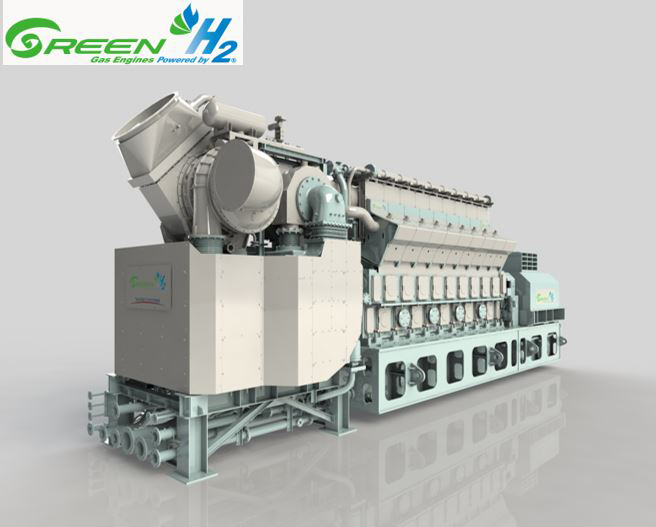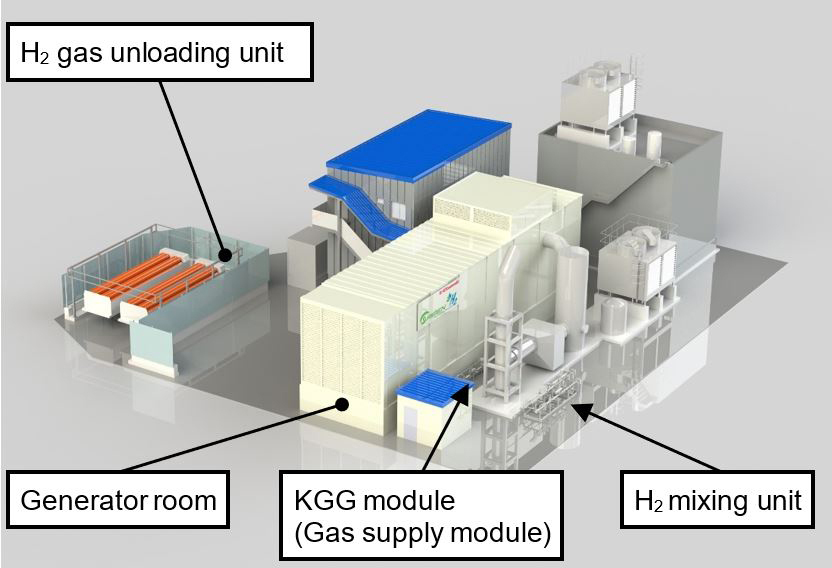Kawasaki Builds Japan’s First Thirty-percent-hydrogen Mixed-fuel Large Gas Engine Verification Testing Facility
Apr. 15, 2024


Tokyo, April 15, 2024 — Kawasaki Heavy Industries, Ltd. announced today its commencement of modification and installation work for Japan’s first full-scale verification testing facility for a large, 8 MW class gas engine that will use 30% hydrogen mixed-fuel combustion for power generation operations.
The project will use a 7.5 MW output gas engine (engine model: KG-18-T) at Kobe Works currently utilized in power generation operations using city gas as fuel. This engine will be modified to achieve compatibility with mixed-fuel combustion using hydrogen, with primary modifications entailing the addition of a hydrogen supply system and improvements to the combustion chamber. Facility preparations are scheduled for completion in May 2024, with mixed-fuel combustion operations slated to start in October of the same year.
The company developed the Kawasaki Green Gas Engine in-house based on the concepts of high efficiency and low nitrogen oxide (NOx) emissions, achieving power generation operations boasting the world’s most efficient performance in its output class. Kawasaki’s gas engines offer excellent startup performance enabling attainment of maximum generation output within five minutes of start command issuance, which will be an important factor in facilitating effective responses to demand fluctuations in power supply networks as renewable energy becomes more widespread in the future.
Based on technologies and knowledge in this field, Kawasaki is currently developing mixed-combustion gas engines that use hydrogen with the aim of realizing carbon neutrality by 2050. Hydrogen fuel has a faster combustion rate and higher combustion temperature than fuels such as city gas and natural gas. These factors create the risk of abnormal combustion, as well as overheating in combustion chamber components which can accelerate deterioration of equipment. To address these issues, Kawasaki has developed a proprietary engine control system that can optimally control combustion conditions based on the user’s operating environment such as power generation output and the ratio of hydrogen in the fuel mixture. The company has also made changes to combustion chamber design specifications which enable achievement of the same generation output as a conventional gas engine, even during mixed-fuel operations using hydrogen fuel. Utilizing these technologies, Kawasaki has verified operational stability during mixed-fuel combustion using hydrogen in verification operations of a single-cylinder test engine. Compared with city-gas-only combustion, mixed-fuel combustion with a 30% hydrogen-to-city-gas ratio achieves a CO2 emissions reduction of approximately 1,150 metric tons,* which is equivalent to the annual emissions of roughly 420 households.
In 2025, Kawasaki is planning a market release for the hydrogen mixed-fuel combustion Kawasaki Green Gas Engine model, as well as the start of existing-engine modification services to enable mixed-fuel combustion using hydrogen.
With the aim of further disseminating hydrogen-based energy in order to achieve a carbon neutral society, Kawasaki is developing technologies for all phases of the hydrogen supply chain (production, transportation, storage and utilization). In the area of “utilization,” hydrogen gas engines are vital products that will make significant contributions toward the elimination of carbon emissions in Japan’s power generation industry, which accounts for roughly 40% of the nation’s CO2 emissions. Moving forward, Kawasaki will continue working toward the goal of carbon neutrality through applications of hydrogen-related technologies in currently operational Kawasaki gas engines and development of other new hydrogen-energy utilization methods.
| * | When operated at a power generation output of 7,500 kW for an annual total of 4,000 hours, with a CO2 emission factor of 2.29 kg CO2/Nm3 |
Related Links
Kawasaki Develops Thirty-percent-hydrogen Mixed-fuel Combustion Technology for Large Gas Engines (March 16, 2022)
https://global.kawasaki.com/en/corp/newsroom/news/detail/?f=20220316_5173
Kawasaki Green Gas Engine
https://global.kawasaki.com/en/corp/sustainability/environment/consideration/pdf/item_2021_02_e.pdf
Contact
If you need more information about our business,
please feel free to contact us.





